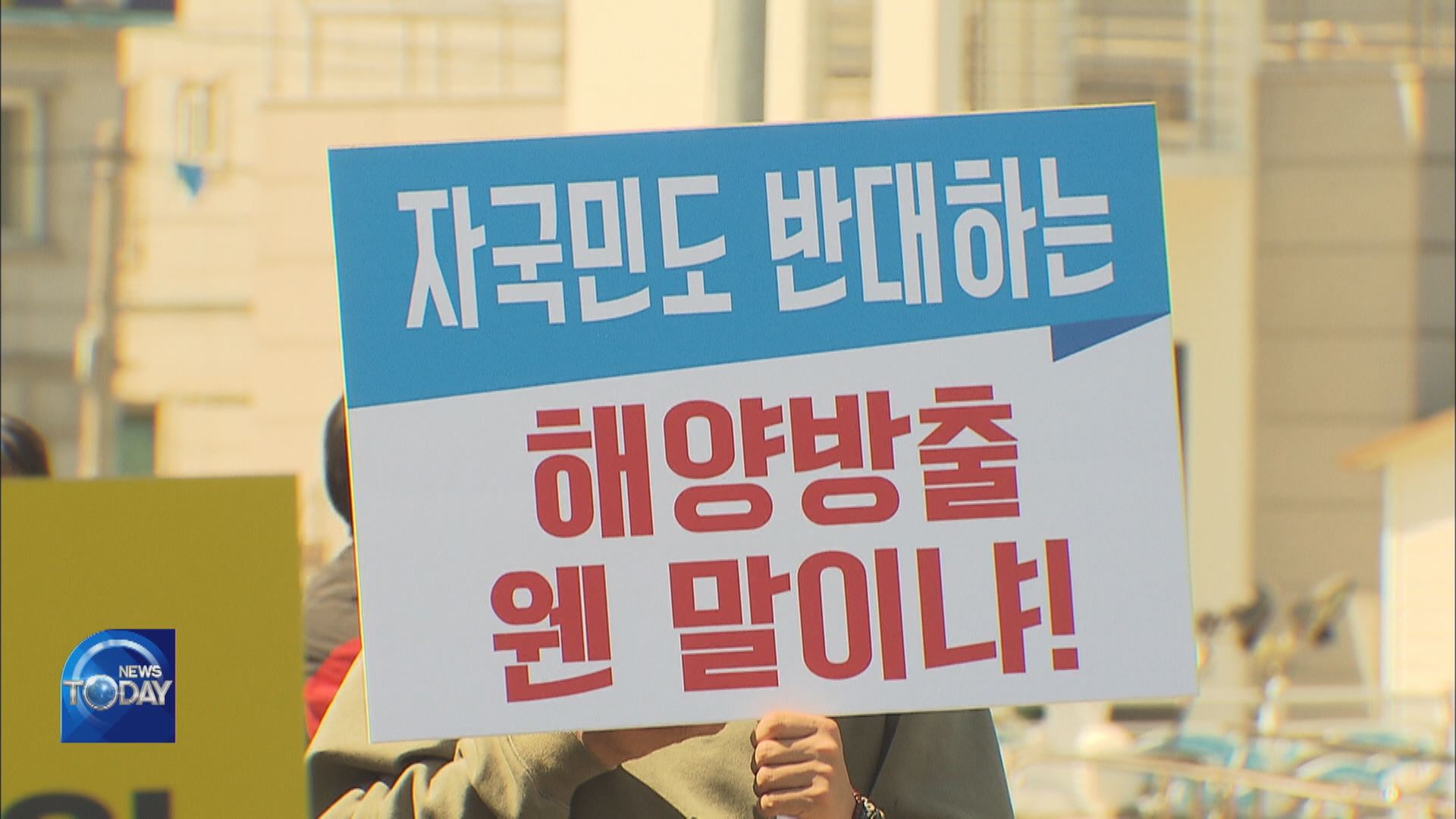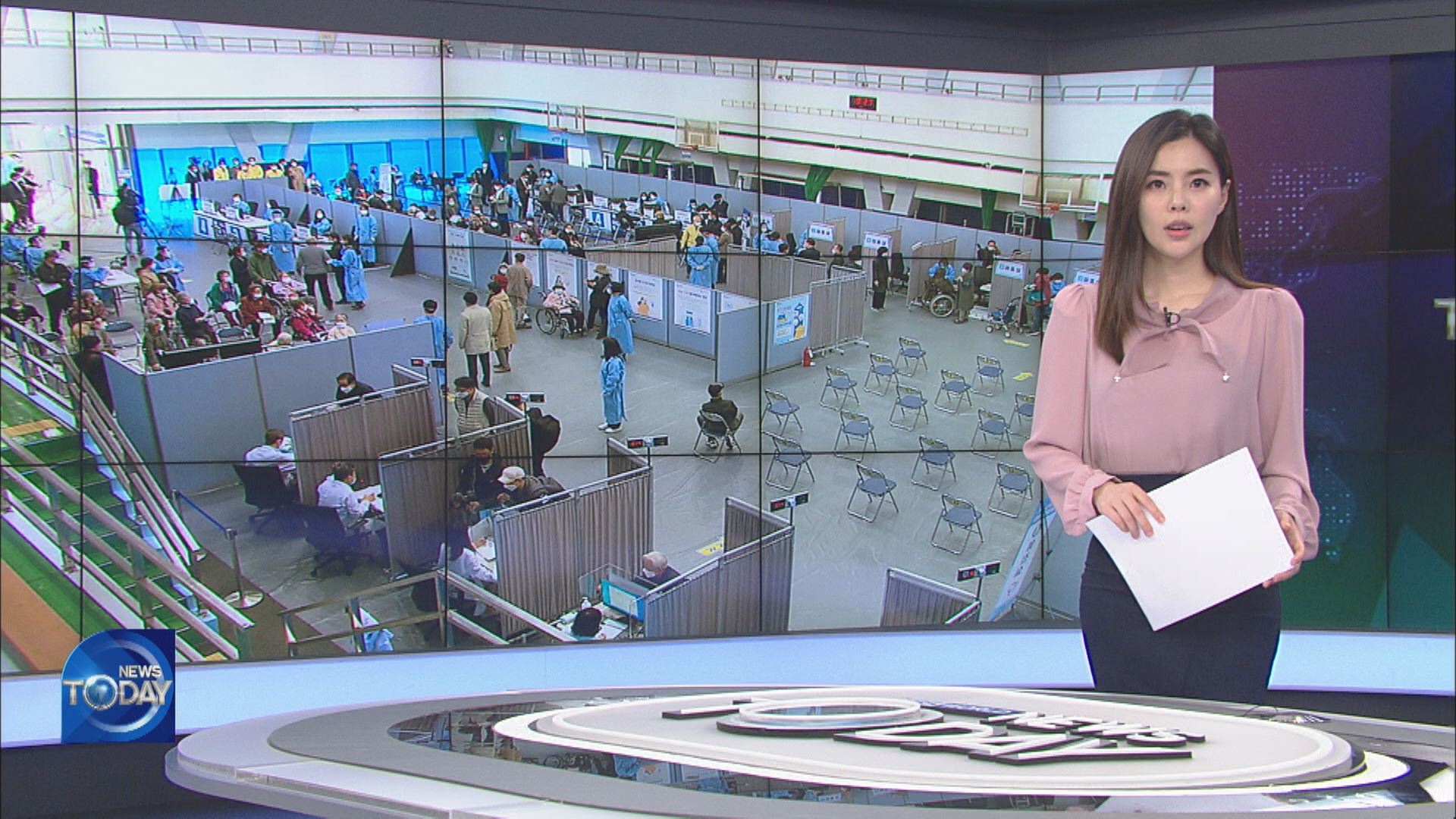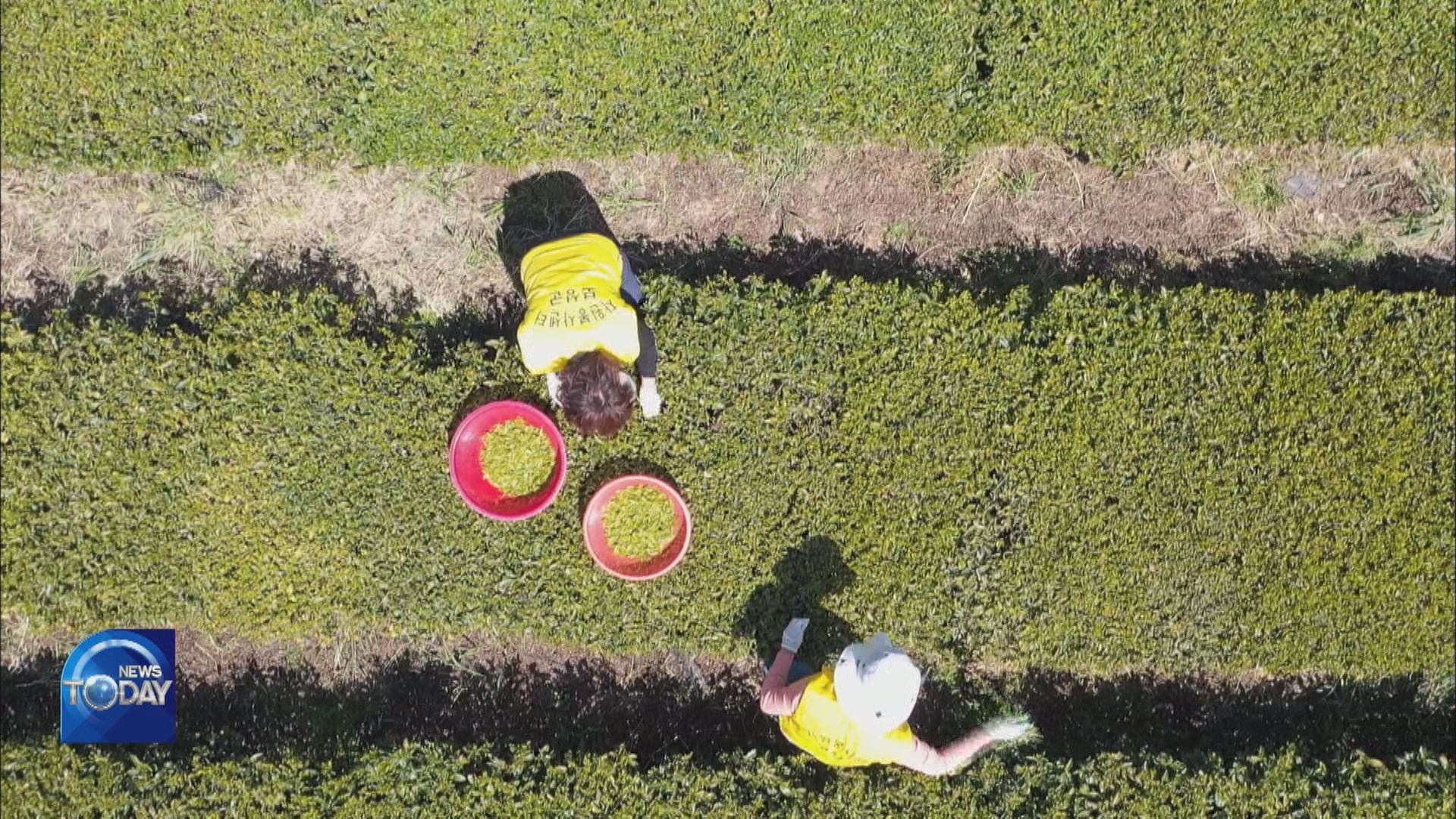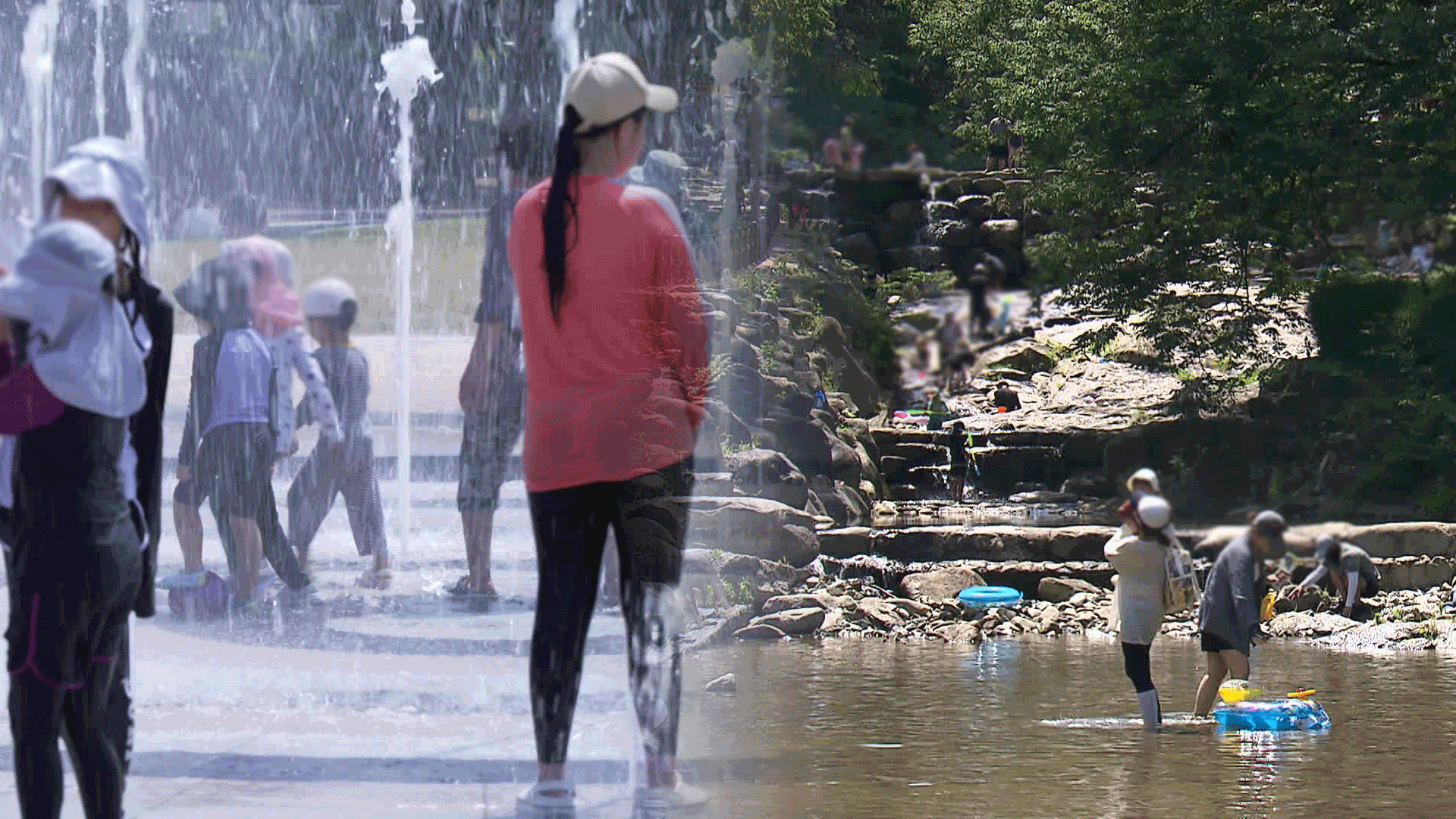PROTESTS AGAINST JAPAN'S DECISION
입력 2021.04.20 (15:26)
수정 2021.04.20 (16:45)
읽어주기 기능은 크롬기반의
브라우저에서만 사용하실 수 있습니다.
[Anchor Lead]
Korean fishers are strongly protesting against the Japanese government's decision to discharge radioactive water into the ocean. It is highly likely that Korean fishers will be dealt a direct blow if consumer distrust the safety of fisheries and marine products, following the release of radioactive water. The Ministry of Food and Drug Safety says it will strengthen radioactive testing on marine products imported from Japan.
[Pkg]
Some 50 fishing vessels stand still in a circle at sea. They gathered to denounce the Japanese government's plan to dispose of radioactive water from the Fukushima nuclear power plant into the ocean. The fishermen strongly oppose Tokyo's decision, saying the contaminated water will flow into Korean waters to damage spawning grounds of fish and shellfish and eventually destroy the nation's marine eco system.
[Soundbite] Baek Heon-ki(Geoje Fisher) : "If radioactive water is discharged into the ocean, it will affect the whole nation and ruin our dietary life."
Roughly 170 fishing ships held a protest off the coast of Yeosu, Jeollanam-do Province. Remembering the 2011 Fukushima nuclear disaster's devastating impact, they worry that Japan's radioactive water discharge will again discourage consumption of marine products and deal a direct blow to their livelihoods.
[Soundbite] Kim Eun-jin(Yeosu Fisher) : "If the polluted water flows into Korean waters in one or two years, people will hardly buy marine products. That means a financial crisis for us."
In an effort to help ease growing public concerns, the Ministry of Food and Drug Safety launched safety inspections on marine products imported from Japan.
[Soundbite] Kim Gang-lip(Minister of Food and Drug Safety) : "Taking the ultimate responsibility for food safety, we will exert our utmost to ensure the safety of marine products consumed by Korean people."
The ministry says it has strengthened measures to ensure the safety of Japanese marine products. Last year, it introduced 13 more high purity germanium radiation detectors, bringing the total to 36. It also increased the number of staffers in charge to 12. The ministry pledged to do its best to guarantee the safety of marine products on the nation's market.
Korean fishers are strongly protesting against the Japanese government's decision to discharge radioactive water into the ocean. It is highly likely that Korean fishers will be dealt a direct blow if consumer distrust the safety of fisheries and marine products, following the release of radioactive water. The Ministry of Food and Drug Safety says it will strengthen radioactive testing on marine products imported from Japan.
[Pkg]
Some 50 fishing vessels stand still in a circle at sea. They gathered to denounce the Japanese government's plan to dispose of radioactive water from the Fukushima nuclear power plant into the ocean. The fishermen strongly oppose Tokyo's decision, saying the contaminated water will flow into Korean waters to damage spawning grounds of fish and shellfish and eventually destroy the nation's marine eco system.
[Soundbite] Baek Heon-ki(Geoje Fisher) : "If radioactive water is discharged into the ocean, it will affect the whole nation and ruin our dietary life."
Roughly 170 fishing ships held a protest off the coast of Yeosu, Jeollanam-do Province. Remembering the 2011 Fukushima nuclear disaster's devastating impact, they worry that Japan's radioactive water discharge will again discourage consumption of marine products and deal a direct blow to their livelihoods.
[Soundbite] Kim Eun-jin(Yeosu Fisher) : "If the polluted water flows into Korean waters in one or two years, people will hardly buy marine products. That means a financial crisis for us."
In an effort to help ease growing public concerns, the Ministry of Food and Drug Safety launched safety inspections on marine products imported from Japan.
[Soundbite] Kim Gang-lip(Minister of Food and Drug Safety) : "Taking the ultimate responsibility for food safety, we will exert our utmost to ensure the safety of marine products consumed by Korean people."
The ministry says it has strengthened measures to ensure the safety of Japanese marine products. Last year, it introduced 13 more high purity germanium radiation detectors, bringing the total to 36. It also increased the number of staffers in charge to 12. The ministry pledged to do its best to guarantee the safety of marine products on the nation's market.
■ 제보하기
▷ 카카오톡 : 'KBS제보' 검색, 채널 추가
▷ 전화 : 02-781-1234, 4444
▷ 이메일 : kbs1234@kbs.co.kr
▷ 유튜브, 네이버, 카카오에서도 KBS뉴스를 구독해주세요!
- PROTESTS AGAINST JAPAN'S DECISION
-
- 입력 2021-04-20 15:26:30
- 수정2021-04-20 16:45:23

[Anchor Lead]
Korean fishers are strongly protesting against the Japanese government's decision to discharge radioactive water into the ocean. It is highly likely that Korean fishers will be dealt a direct blow if consumer distrust the safety of fisheries and marine products, following the release of radioactive water. The Ministry of Food and Drug Safety says it will strengthen radioactive testing on marine products imported from Japan.
[Pkg]
Some 50 fishing vessels stand still in a circle at sea. They gathered to denounce the Japanese government's plan to dispose of radioactive water from the Fukushima nuclear power plant into the ocean. The fishermen strongly oppose Tokyo's decision, saying the contaminated water will flow into Korean waters to damage spawning grounds of fish and shellfish and eventually destroy the nation's marine eco system.
[Soundbite] Baek Heon-ki(Geoje Fisher) : "If radioactive water is discharged into the ocean, it will affect the whole nation and ruin our dietary life."
Roughly 170 fishing ships held a protest off the coast of Yeosu, Jeollanam-do Province. Remembering the 2011 Fukushima nuclear disaster's devastating impact, they worry that Japan's radioactive water discharge will again discourage consumption of marine products and deal a direct blow to their livelihoods.
[Soundbite] Kim Eun-jin(Yeosu Fisher) : "If the polluted water flows into Korean waters in one or two years, people will hardly buy marine products. That means a financial crisis for us."
In an effort to help ease growing public concerns, the Ministry of Food and Drug Safety launched safety inspections on marine products imported from Japan.
[Soundbite] Kim Gang-lip(Minister of Food and Drug Safety) : "Taking the ultimate responsibility for food safety, we will exert our utmost to ensure the safety of marine products consumed by Korean people."
The ministry says it has strengthened measures to ensure the safety of Japanese marine products. Last year, it introduced 13 more high purity germanium radiation detectors, bringing the total to 36. It also increased the number of staffers in charge to 12. The ministry pledged to do its best to guarantee the safety of marine products on the nation's market.
Korean fishers are strongly protesting against the Japanese government's decision to discharge radioactive water into the ocean. It is highly likely that Korean fishers will be dealt a direct blow if consumer distrust the safety of fisheries and marine products, following the release of radioactive water. The Ministry of Food and Drug Safety says it will strengthen radioactive testing on marine products imported from Japan.
[Pkg]
Some 50 fishing vessels stand still in a circle at sea. They gathered to denounce the Japanese government's plan to dispose of radioactive water from the Fukushima nuclear power plant into the ocean. The fishermen strongly oppose Tokyo's decision, saying the contaminated water will flow into Korean waters to damage spawning grounds of fish and shellfish and eventually destroy the nation's marine eco system.
[Soundbite] Baek Heon-ki(Geoje Fisher) : "If radioactive water is discharged into the ocean, it will affect the whole nation and ruin our dietary life."
Roughly 170 fishing ships held a protest off the coast of Yeosu, Jeollanam-do Province. Remembering the 2011 Fukushima nuclear disaster's devastating impact, they worry that Japan's radioactive water discharge will again discourage consumption of marine products and deal a direct blow to their livelihoods.
[Soundbite] Kim Eun-jin(Yeosu Fisher) : "If the polluted water flows into Korean waters in one or two years, people will hardly buy marine products. That means a financial crisis for us."
In an effort to help ease growing public concerns, the Ministry of Food and Drug Safety launched safety inspections on marine products imported from Japan.
[Soundbite] Kim Gang-lip(Minister of Food and Drug Safety) : "Taking the ultimate responsibility for food safety, we will exert our utmost to ensure the safety of marine products consumed by Korean people."
The ministry says it has strengthened measures to ensure the safety of Japanese marine products. Last year, it introduced 13 more high purity germanium radiation detectors, bringing the total to 36. It also increased the number of staffers in charge to 12. The ministry pledged to do its best to guarantee the safety of marine products on the nation's market.
이 기사가 좋으셨다면
-
좋아요
0
-
응원해요
0
-
후속 원해요
0

















이 기사에 대한 의견을 남겨주세요.